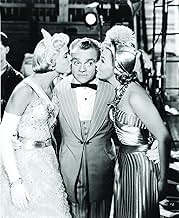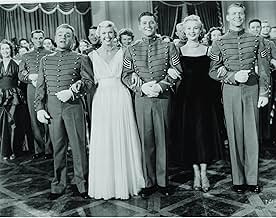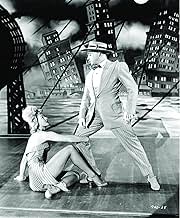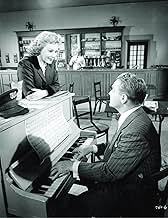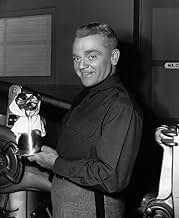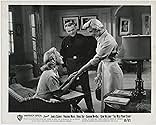NOTE IMDb
6,2/10
1,6 k
MA NOTE
Ajouter une intrigue dans votre langueA Broadway director helps the West Point cadets put on a show, aided by two lovely ladies and assorted complications.A Broadway director helps the West Point cadets put on a show, aided by two lovely ladies and assorted complications.A Broadway director helps the West Point cadets put on a show, aided by two lovely ladies and assorted complications.
- Réalisation
- Scénario
- Casting principal
- Nommé pour 1 Oscar
- 2 nominations au total
John Baer
- Young Cadet
- (non crédité)
DeWit Bishop
- Cadet
- (non crédité)
Jack Boyle Jr.
- Cadet in Show
- (non crédité)
Tex Brodus
- Cadet
- (non crédité)
Wheaton Chambers
- President's Secretary
- (non crédité)
Chuck Courtney
- Plebe
- (non crédité)
Paul Cristo
- Officer
- (non crédité)
Luther Crockett
- Senator
- (non crédité)
Avis à la une
James Cagney wrote in his autobiography that the only films he watched in his retirement years continually were the musical ones. He regretted he didn't do more of them. So do I, so should we all.
While The West Point Story isn't the greatest film Cagney ever did at Warner Brothers, it's far from the worst and I find it charming and entertaining.
This was his second film with Virginia Mayo and quite a contrast it was after White Heat. The lovely Ms. Mayo also got to show what a good dancer she was both with Cagney and Gene Nelson.
The singing is carried in this film by Doris Day and Gordon MacRae. Usually folks don't think of Gordon MacRae as Doris's most frequent leading man, but in fact he did four films with her. He had a wonderful baritone voice and he could easily adapt to light musical fare like The West Point Story or do operetta like The Desert Song which he did a few years later. It's too bad for MacRae that he did not come along 20 years earlier and could have done a few of those operettas the way Nelson Eddy did.
Gene Nelson was a fine dancer who when musicals went out of vogue, turned to directing. Another talented performer who came along a little too late. He never got the credit for being the fine dancer he was.
The plot is simple, James Cagney and Virginia Mayo once a good pair of top choreographers are reduced to seedy nightclub work. Cagney gets an opportunity to go to West Point to help put on the annual 100th night show the graduating class does. The catch is he has to try to lure Gordon MacRae to the bright lights of Broadway for his producer uncle Roland Winters. From there the plot evolves.
And it's a nice story with good musical numbers even though Jule Styne and Sammy Cahn got no hits out of the score. Still the songs are well integrated into the plot.
I think people will enjoy watching The West Point Story.
While The West Point Story isn't the greatest film Cagney ever did at Warner Brothers, it's far from the worst and I find it charming and entertaining.
This was his second film with Virginia Mayo and quite a contrast it was after White Heat. The lovely Ms. Mayo also got to show what a good dancer she was both with Cagney and Gene Nelson.
The singing is carried in this film by Doris Day and Gordon MacRae. Usually folks don't think of Gordon MacRae as Doris's most frequent leading man, but in fact he did four films with her. He had a wonderful baritone voice and he could easily adapt to light musical fare like The West Point Story or do operetta like The Desert Song which he did a few years later. It's too bad for MacRae that he did not come along 20 years earlier and could have done a few of those operettas the way Nelson Eddy did.
Gene Nelson was a fine dancer who when musicals went out of vogue, turned to directing. Another talented performer who came along a little too late. He never got the credit for being the fine dancer he was.
The plot is simple, James Cagney and Virginia Mayo once a good pair of top choreographers are reduced to seedy nightclub work. Cagney gets an opportunity to go to West Point to help put on the annual 100th night show the graduating class does. The catch is he has to try to lure Gordon MacRae to the bright lights of Broadway for his producer uncle Roland Winters. From there the plot evolves.
And it's a nice story with good musical numbers even though Jule Styne and Sammy Cahn got no hits out of the score. Still the songs are well integrated into the plot.
I think people will enjoy watching The West Point Story.
James Cagney really gives his all (and that's plenty of talent) to the role of a rambunctious song-and-dance man who takes over a show at West Point, with the help of a talented cast including Virginia Mayo, Doris Day, Gordon MacRae and Gene Nelson. Cagney struts around getting angry and defiant as only he can, bringing lots of much needed life to a tiresome script. It's one of his best as a song-and-dance man, making one wish he had done even more musical films.
But this one could have used Technicolor and a wittier script with better songs. All of the talent cannot overcome the story's limitations and the overuse of rear projection photography for many of the outdoor scenes. Alan Hale, Jr. gets some good chuckles out of his "Princess" role and there's a light-heartiness about the whole film that keeps it entertaining enough for the most part.
Doris Day is missing from the first third of the movie, but once she shows up she demonstrates why she became such a cheerful Warner Bros. star. She and Gordon MacRae do nicely by a couple of forgettable songs.
Summing up: Worth seeing for Cagney alone. He's in fine shape for some energetic dance routines.
But this one could have used Technicolor and a wittier script with better songs. All of the talent cannot overcome the story's limitations and the overuse of rear projection photography for many of the outdoor scenes. Alan Hale, Jr. gets some good chuckles out of his "Princess" role and there's a light-heartiness about the whole film that keeps it entertaining enough for the most part.
Doris Day is missing from the first third of the movie, but once she shows up she demonstrates why she became such a cheerful Warner Bros. star. She and Gordon MacRae do nicely by a couple of forgettable songs.
Summing up: Worth seeing for Cagney alone. He's in fine shape for some energetic dance routines.
When previewing a performance for the musical show being put on, Cagney says "Wouldn't hiss, wouldn't cheer." That about sums it up perfectly, except that I am hissing - some. This movie musical about Cagney helping West Point cadets put on a musical revue, simply just lays there. Despite his energetic presence and the talents of Doris Day, Gordon MacRae, Gene Nelson, and Virginia Mayo, it comes across as lifeless. The musical numbers are upbeat and Cagney uses his whole body to show disgust for incompetent amateurs (if you've seen it, you know what I mean,) but the songs are not original or grand enough to really stand out. It may seem pleasant enough at the time, but after nearly two hours, you feel worn out. See another Doris Day or James Cagney film first.
He spits out lame dialog like it was Shakespeare, he talk-sings with a verve that could give Rex Harrison or Robert Preston lessons, he stomps up and down, he uppercuts, he dances up a storm. There's plenty of A-list talent in this uninspired Warners musical, but a 51-year-old Cagney is pretty much the whole show, and he appears to believe in the hole-filled plot so much that you buy it, too, despite the many lapses of logic. I find his teaming with Virginia Mayo a little distasteful--he's plainly too old for her--but she lends a lot of enthusiasm, too, as does Doris Day, given some middling Jule Styne-Sammy Cahn ballads to warble (and some very unattractive gowns to model), and Gene Nelson, tapping exuberantly, and Gordon MacRae, with his fine natural baritone. Cagney felt he did his best dancing in this film, and it's worth sitting through the dated, hit-you-on-the-head patriotism and weird plot mechanics to get to his virtuosic numbers--he even taps a bit with Day, who started out as a dancer and keeps up brilliantly with him. It's not a good movie, exactly, but I'd trade a lot of neater, better-crafted musicals for this one's dumb liveliness, and for Cagney's genius. I mentioned Robert Preston above; Cagney was, in fact, considered for Professor Harold Hill before Preston was hired. I think he'd have been terrific.
... but just forget that and have fun with it. Cagney is Elwin "Bix" Bixby who is a washed up Broadway director, not because he is bad at his job, but because he crossed producer Eberhart (Roland Winters) by getting dancer/singer Jan Wilson (Doris Day) out of the chorus where he felt she was misused, and into a Hollywood contract by teaching her everything he knew.
Bix has a chance to square things with Eberhart and his increasingly impatient fiancée (Virginia Mayo as Eve) by taking a job at West Point directing a show written by Eberhart's nephew, cadet Tom Fletcher (Gordon McRae). What Eberhart really wants is his nephew to leave the army and go on Broadway, where he feels his talents won't be wasted. Bix takes the job, and is soon agreeing with Eberhart's assessment - Tom has the looks, can sing, dance AND wrote the show. Bix can't figure why Tom wants to work for minor duckets in the Army when he could clean up and be famous on Broadway. Why doesn't he just quit West Point? Now Bix is not a bad guy. He's got great courage, he just has a problem with rules, doesn't quite get the concept of camaraderie, and he has an unruly temperament - would you expect less from a Cagney role? Bix just doesn't get these cadets only showing up for rehearsal when their classes and the academy rules permit it, and then one day he punches a cadet and is out of a job UNLESS he becomes a cadet, living the life a cadet along with the uniform, the haircut, and the plebe status. At this point Bix's war record is brought up. Like I said before he had great courage, even saving his platoon in Italy in WWII, but he went AWOL so many times that if this film was true to life he'd actually be in Leavenworth turning big rocks into little ones. This is one of many times you are just going to have to suspend your beliefs.
How does Doris Day figure into all of this? Well it turns out Day, as the girl Bix rescued from the chorus line years ago, is in town, so Bix gets permission to try and get her to come to West Point for an appearance AND he tries to talk her into being the princess in the play. If not they are stuck with Alan Hale Jr. as the princess and romantic lead to Gordon McRae's character. There is only so much suspension of belief that an audience can take! All of this is just a chance for Bix to learn the importance of rules and teamwork he never learned in the war, for some patriotic numbers and speeches that didn't do a movie studio any harm in 1950 in the age of HUAC, and for Warner Brothers to "pass the baton" as you might say to their new generation of singers and dancers, embodied by McRae and Doris Day. Don't worry though, there is enough of Cagney's great dancing to satisfy.
The weirdest thing for me - seeing Cagney and Mayo play a rather functional couple after seeing them together in 1949's White Heat where they had the kind of love life you would expect between a psychopath and a gun moll with wandering eyes.
Bix has a chance to square things with Eberhart and his increasingly impatient fiancée (Virginia Mayo as Eve) by taking a job at West Point directing a show written by Eberhart's nephew, cadet Tom Fletcher (Gordon McRae). What Eberhart really wants is his nephew to leave the army and go on Broadway, where he feels his talents won't be wasted. Bix takes the job, and is soon agreeing with Eberhart's assessment - Tom has the looks, can sing, dance AND wrote the show. Bix can't figure why Tom wants to work for minor duckets in the Army when he could clean up and be famous on Broadway. Why doesn't he just quit West Point? Now Bix is not a bad guy. He's got great courage, he just has a problem with rules, doesn't quite get the concept of camaraderie, and he has an unruly temperament - would you expect less from a Cagney role? Bix just doesn't get these cadets only showing up for rehearsal when their classes and the academy rules permit it, and then one day he punches a cadet and is out of a job UNLESS he becomes a cadet, living the life a cadet along with the uniform, the haircut, and the plebe status. At this point Bix's war record is brought up. Like I said before he had great courage, even saving his platoon in Italy in WWII, but he went AWOL so many times that if this film was true to life he'd actually be in Leavenworth turning big rocks into little ones. This is one of many times you are just going to have to suspend your beliefs.
How does Doris Day figure into all of this? Well it turns out Day, as the girl Bix rescued from the chorus line years ago, is in town, so Bix gets permission to try and get her to come to West Point for an appearance AND he tries to talk her into being the princess in the play. If not they are stuck with Alan Hale Jr. as the princess and romantic lead to Gordon McRae's character. There is only so much suspension of belief that an audience can take! All of this is just a chance for Bix to learn the importance of rules and teamwork he never learned in the war, for some patriotic numbers and speeches that didn't do a movie studio any harm in 1950 in the age of HUAC, and for Warner Brothers to "pass the baton" as you might say to their new generation of singers and dancers, embodied by McRae and Doris Day. Don't worry though, there is enough of Cagney's great dancing to satisfy.
The weirdest thing for me - seeing Cagney and Mayo play a rather functional couple after seeing them together in 1949's White Heat where they had the kind of love life you would expect between a psychopath and a gun moll with wandering eyes.
Le saviez-vous
- GaffesAt last minute, Jan (a female movie star) makes a surprise appearance in a role in an all-male West Point revue, in a part everyone assumed was to be played by a man. But a few minutes later there's a photo of her in closeup in the program featuring stars of the production.
- Citations
Eve Dillon: You heel! Can't even pay a hotel bill! In debt up to your ears, and it's horses! Horses every second you're awake! Horses, horses, horses!
Elwin 'Bix' Bixby: [unapologetically] I don't drink or smoke.
- ConnexionsFeatured in Biography: Doris Day: It's Magic (1998)
- Bandes originalesAlma Mater
(uncredited)
Music by Friedrich Kücken (song Treue Liebe)
Lyrics by Paul S. Reinecke
Sung by a chorus during the opening credits
Meilleurs choix
Connectez-vous pour évaluer et suivre la liste de favoris afin de recevoir des recommandations personnalisées
- How long is The West Point Story?Alimenté par Alexa
Détails
- Date de sortie
- Pays d’origine
- Langues
- Aussi connu sous le nom de
- The West Point Story
- Lieux de tournage
- Société de production
- Voir plus de crédits d'entreprise sur IMDbPro
- Durée1 heure 47 minutes
- Couleur
- Rapport de forme
- 1.33 : 1
Contribuer à cette page
Suggérer une modification ou ajouter du contenu manquant


